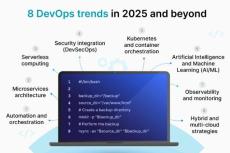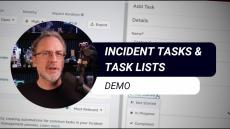|
By xMatters
Artificial intelligence (AI) is reshaping industries, and software development is no exception. By integrating AI technologies like machine learning, generative AI, and natural language processing, development teams can optimize workflows, enhance code quality, and reduce time-to-market. In this article, we’ll examine AI in software development, including its benefits, challenges, and most recent developments. Let’s get started.
|
By xMatters
More than ever, DevOps teams are constantly tasked with improving collaboration, accelerating software development, and ensuring smooth operations. However, traditional monitoring and alerting methods, often called a “black box approach,” offer limited insight into system performance. As a result, teams rely on reactive approaches, only responding to incidents after they occur without prior planning or strategy.
|
By xMatters
Mean time to repair (MTTR), sometimes referred to as mean time to resolution, is a popular DevOps and site reliability engineering (SRE) team metric. MTTR identifies the overall availability and disaster recovery aspects of your IT assets or application workloads. The acronym MTTR can cause some confusion since it has different meanings across different industries. Sometimes, MTTR refers to mean time to respond: the amount of time needed to react to a problem.
|
By xMatters
Observability refers to the ability of the DevOps team to track, monitor, and measure the state of their pipeline and operations. Without observability, you are working in the dark, unaware of what is working. With the growing complexity of modern IT systems, DevOps observability is no longer optional. Gartner estimates that by 2026, 50% of enterprises implementing distributed data architectures will have adopted data observability tools, up from less than 20% in 2024.
|
By xMatters
We often hear about the many benefits AIOps (Artificial Intelligence for IT Operations) brings to businesses. But how can you develop an effective AIOps strategy? Where do you even start? What are the best practices or implementation challenges? These and many more questions must be answered before beginning your AIOps journey. In this guide, we will explore the steps for creating an effective AIOps strategy and discuss crucial components, obstacles, and best practices for successful implementation.
|
By xMatters
With the complex and steadfast growth of IT service delivery processes, organizations and their internal teams have come to rely on several tools in their toolbox to deliver best-in-class products and services. The use of AIOps, AI/ML, and overall automation has shaped modern delivery methods, but what we call this process, and how we grow to advance it, has yet to find a definition that’s universally recognized.
|
By xMatters
What is the future of software development and deployment? DevOps processes have helped take developers and operations folks out of their silos and share responsibilities. But is it enough to succeed long term? Many companies have yet to embrace DevOps completely across their teams. Clearly, the culture of sharing tools, a key aspect of DevOps, is not enough.
|
By xMatters
Artificial Intelligence for IT Operations (AIOps) transforms how IT teams manage increasingly complex infrastructures. But what is AIOps? AIOps is the practice of applying artificial intelligence, machine learning, and advanced analytics to automate and improve IT operations.
|
By xMatters
Speed and reliability in incident management have always been the formula for many businesses’ success. But what happens when this already demanding workflow needs to be done at scale? The answer is adopting enterprise DevOps methodologies to scale operations efficiently. DevOps benefits are magnified when they are correctly scaled across an entire enterprise. In this comprehensive guide, we’ll explore enterprise DevOps’s fundamental principles, challenges, and components.
|
By xMatters
As the demand for instant innovation and real-time delivery of mission-critical processes continues to grow, your organization risks falling behind if it can’t adapt to an automation-centric strategy. To succeed, managers must loosen the reins and enable teams to automate DevOps processes. Automating DevOps processes is not an all-or-nothing decision, and implementing automation processes can let teams adapt to the changing environment and let go, little by little.
|
By xMatters
If you’re not an expert in destroying energy shields, dodging enemy swirls, or using space cannons to avenge your home planet like players in Yars’ Revenge, don’t worry! Our latest release is here to help you focus on fighting incidents that are a little more down to earth! Let’s take a look at some of the new features you’ll find in your incident-fighting arsenal.
|
By xMatters
In xMatters, groups are used to organize people based on certain attributes. For example, you can create a group for a resolver team, for everyone based in a specific office location, or containing only people with a shared skill.
|
By xMatters
Blast off into a new era of incident resolution! Your teams may not have to choose between ground tanks or flying planes like they do in the arcade game, but with our Xenon release, resolvers will be able to quickly switch between strategies to ensure they’re always working as effectively as possible. So, let’s see what’s packed in this mission’s inventory.
|
By xMatters
You’ll be resolving incidents faster than a caveman on a skateboard with our latest release, Wonder Boy! Since we don’t have any prehistoric monsters to deal with these days, we’re focusing on the future of incident management with a ton of exciting new features and updates packed into this release!
|
By xMatters
Everbridge xMatters automates workflows to eliminate business-impacting digital events, leveraging analytics, automation, and AI to improve response time and resolution. I will be walking through key features in xMatters that will keep your digital businesses running, reducing the frequency, duration, and associated cost of critical service disruptions.
|
By xMatters
When all systems are firing, managing your incident management processes can feel a little out of this world. For this release, we've packed in more features than can fit into the City of Mystery. But never fear! You don't need to be part of a space program to join this intergalactic quest. All xMatters instances now include powerful new features and updates from our latest release: Learn more about these features and all the other exciting updates in our Vanguard Release Overview.
|
By xMatters
When teams are in the heat of an incident, it's crucial that everyone knows what needs to be done and who is working on what. With the new tasks section, you can add tasks or task lists, assign them to users, set a due time and date and much more.
|
By xMatters
Because digital services can experience thousands of changes per day, it’s critical to intelligently surface change information in a way that’s meaningful and actionable for resolvers. By presenting relevant changes within the context of an incident, resolvers can identify recently changed services, gain greater insight into potential root causes, and immediately take action to mitigate and resolve the issue. Let’s take a look at Change Management in xMatters.
|
By xMatters
Eliminate digital event disruptions by leveraging AI, analytics, and workflows to automate and accelerate response times all the way to resolution. Only with xMatters.
|
By xMatters
Everbridge xMatters automates workflows to eliminate business-impacting digital events, leveraging analytics, automation, and AI to improve response time and resolution. We keep digital businesses running, reducing the frequency, duration, and associated cost of critical service disruptions. Build operational resilience and automate all the way to resolution with Everbridge xMatters.
|
By xMatters
In a world where IT teams and DevOps groups are tasked with not only keeping the lights on but also driving business efficiencies and providing a stellar digital experience to the customer, automation is imperative. Even better is automation between multiple systems for ease of healing when an incident occurs.
|
By xMatters
Download the new AIOps Buyer's Guide to learn about the use cases and key capabilities of the right AIOps tool.
|
By xMatters
Read the new xMatters guide, Getting the SRE Model Right, to learn how the right approach can help you minimize incidents and limit their severity, free up valuable engineering resources, and lay the groundwork for incident response at scale.
|
By xMatters
We evaluated where enterprises are positioned in the Incident Management Spectrum and in their journey to digital service resilience and found that incident management needs its own transformation. In the report, you'll learn which approach to incident management is the best for meeting today's business imperatives.
|
By xMatters
Providing a superior digital customer experience is a critical component of business success for technology and digital service providers. But an enjoyable, effective, and reliable customer experience demands new IT architectures and places new expectations on the way SREs, development teams, ITOps, executives, and other previously siloed groups work together. And at what costs? To understand, we asked over 300 DevOps, ITOps and business leaders for perspectives.
|
By xMatters
Download the new ChatOps Buyer's Guide to learn about the use cases and key capabilities of the right ChatOps tool.
|
By xMatters
Incident management software helps you recognize, respond to, and remediate incidents quickly, then analyze the incident to learn what went wrong and prevent future, similar incidents. You just need to decide which software is right for your team.
- January 2025 (2)
- December 2024 (4)
- November 2024 (5)
- October 2024 (3)
- July 2024 (1)
- June 2024 (1)
- April 2024 (2)
- March 2024 (4)
- January 2024 (1)
- December 2023 (1)
- November 2023 (2)
- October 2023 (1)
- August 2023 (2)
- July 2023 (2)
- June 2023 (3)
- May 2023 (4)
- April 2023 (3)
- March 2023 (2)
- February 2023 (6)
- January 2023 (5)
- December 2022 (3)
- November 2022 (5)
- October 2022 (4)
- September 2022 (4)
- August 2022 (4)
- July 2022 (4)
- June 2022 (5)
- May 2022 (8)
- April 2022 (4)
- March 2022 (19)
- February 2022 (14)
- January 2022 (16)
- December 2021 (18)
- November 2021 (23)
- October 2021 (17)
- September 2021 (8)
- August 2021 (3)
- July 2021 (6)
- June 2021 (5)
- May 2021 (1)
xMatters service reliability platform helps DevOps, SREs, and operations teams automate workflows, ensure infrastructure and applications are always working, and rapidly deliver products at scale. Our code-free workflow builder, adaptive approach to incident management, and real-time performance analytics all support a single goal: the happiness of your customers.
Automate on the xMatters service reliability platform:
- Workflow automation: Move faster with confidence. Our no-code and low-code integrations let you build flexible workflows to address issues proactively—even during deployments.
- Frictionless on-call: Manage on-call seamlessly. Automatically escalate to the right people, schedule with ease, and act on detailed alerts from anywhere.
- Adaptive incident management: Stay resilient in any scenario with our adaptive approach to incident management. Automate resolution, protect customers from disruptions, and learn from each event.
- Signal intelligence: Put situations in context and cut through the noise of multiple monitoring tools with filtering and suppression, alert correlation, enriched notifications, and routing based on role or function.
- Actionable analytics: Get quick insights into key metrics to understand inefficiencies, boosting collaboration and productivity across engineering and operations teams.
Let xMatters transform your operations.






















